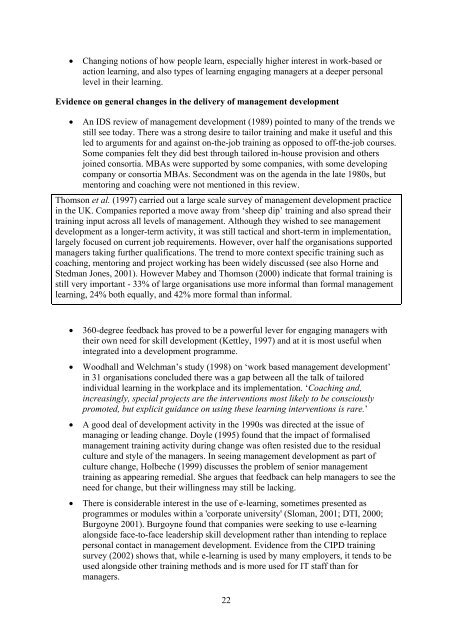The Development of Management and Leadership Capability and its ...
The Development of Management and Leadership Capability and its ...
The Development of Management and Leadership Capability and its ...
Create successful ePaper yourself
Turn your PDF publications into a flip-book with our unique Google optimized e-Paper software.
• Changing notions <strong>of</strong> how people learn, especially higher interest in work-based or<br />
action learning, <strong>and</strong> also types <strong>of</strong> learning engaging managers at a deeper personal<br />
level in their learning.<br />
Evidence on general changes in the delivery <strong>of</strong> management development<br />
• An IDS review <strong>of</strong> management development (1989) pointed to many <strong>of</strong> the trends we<br />
still see today. <strong>The</strong>re was a strong desire to tailor training <strong>and</strong> make it useful <strong>and</strong> this<br />
led to arguments for <strong>and</strong> against on-the-job training as opposed to <strong>of</strong>f-the-job courses.<br />
Some companies felt they did best through tailored in-house provision <strong>and</strong> others<br />
joined consortia. MBAs were supported by some companies, with some developing<br />
company or consortia MBAs. Secondment was on the agenda in the late 1980s, but<br />
mentoring <strong>and</strong> coaching were not mentioned in this review.<br />
Thomson et al. (1997) carried out a large scale survey <strong>of</strong> management development practice<br />
in the UK. Companies reported a move away from ‘sheep dip’ training <strong>and</strong> also spread their<br />
training input across all levels <strong>of</strong> management. Although they wished to see management<br />
development as a longer-term activity, it was still tactical <strong>and</strong> short-term in implementation,<br />
largely focused on current job requirements. However, over half the organisations supported<br />
managers taking further qualifications. <strong>The</strong> trend to more context specific training such as<br />
coaching, mentoring <strong>and</strong> project working has been widely discussed (see also Horne <strong>and</strong><br />
Stedman Jones, 2001). However Mabey <strong>and</strong> Thomson (2000) indicate that formal training is<br />
still very important - 33% <strong>of</strong> large organisations use more informal than formal management<br />
learning, 24% both equally, <strong>and</strong> 42% more formal than informal.<br />
• 360-degree feedback has proved to be a powerful lever for engaging managers with<br />
their own need for skill development (Kettley, 1997) <strong>and</strong> at it is most useful when<br />
integrated into a development programme.<br />
• Woodhall <strong>and</strong> Welchman’s study (1998) on ‘work based management development’<br />
in 31 organisations concluded there was a gap between all the talk <strong>of</strong> tailored<br />
individual learning in the workplace <strong>and</strong> <strong>its</strong> implementation. ‘Coaching <strong>and</strong>,<br />
increasingly, special projects are the interventions most likely to be consciously<br />
promoted, but explicit guidance on using these learning interventions is rare.’<br />
• A good deal <strong>of</strong> development activity in the 1990s was directed at the issue <strong>of</strong><br />
managing or leading change. Doyle (1995) found that the impact <strong>of</strong> formalised<br />
management training activity during change was <strong>of</strong>ten resisted due to the residual<br />
culture <strong>and</strong> style <strong>of</strong> the managers. In seeing management development as part <strong>of</strong><br />
culture change, Holbeche (1999) discusses the problem <strong>of</strong> senior management<br />
training as appearing remedial. She argues that feedback can help managers to see the<br />
need for change, but their willingness may still be lacking.<br />
• <strong>The</strong>re is considerable interest in the use <strong>of</strong> e-learning, sometimes presented as<br />
programmes or modules within a 'corporate university' (Sloman, 2001; DTI, 2000;<br />
Burgoyne 2001). Burgoyne found that companies were seeking to use e-learning<br />
alongside face-to-face leadership skill development rather than intending to replace<br />
personal contact in management development. Evidence from the CIPD training<br />
survey (2002) shows that, while e-learning is used by many employers, it tends to be<br />
used alongside other training methods <strong>and</strong> is more used for IT staff than for<br />
managers.<br />
22
















